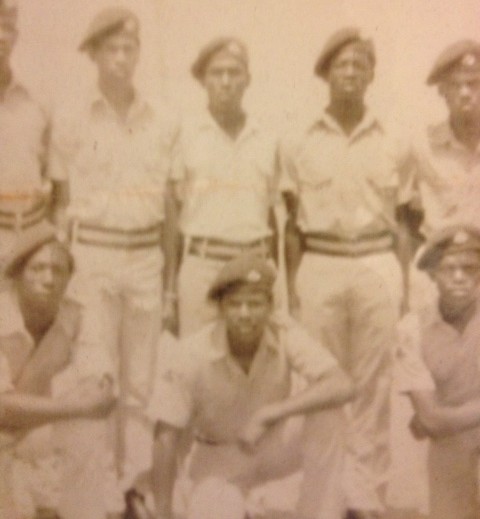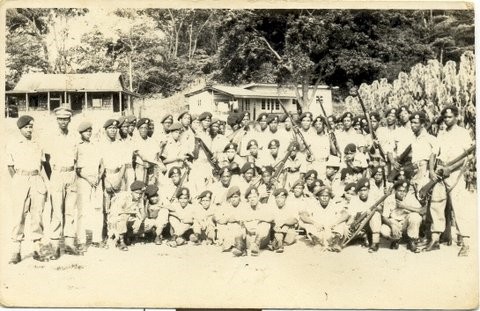Roseau, Dominica (TDN) -- It is a stormy morning in July 1974 and I rest quietly in my bunk at Camp Londonderry on Dominica’s wind-swept Atlantic east coast. It is hurricane season in our Caribbean and the dark grey clouds which I glimpse through the aluminum louvers are common fare for this time of year.
I am leaving the second form to enter the third form at the venerable Dominica Grammar School (DGS), and I am about to begin my third year as a cadet. In 1972 I had joined the cadets in my first week at school.
It was expected of me. Our Dad had served in the British Army in World War II; my oldest brother Wellsworth had been a St. Mary’s Academy (SMA) cadet in the 1960s alongside Eddy Charles, and Franklyn Cuffy; my other brother Lawson was a silver medalist in the Duke of Edinburgh Scheme and my brother Samuel had served with the Cadet Corp alongside people like Jeff Joseph, Felix Gregoire, Coleridge Linton David Andrew, Pierre Charles and Alan Paul.
At the SMA were famous cadets of that time, Dinsdale and Creswell Lawrence, Tony Valmond, Michael Fadelle, and Ackroyd Birmingham, In my early cadet days, I would befriend Emmanuel John Finn, who would go on to blaze a trail at Howard University in Washington, DC and become a distinguished dental surgeon.
But as we are not to parade on this rainy day, I have a Marvel Spiderman comic in my hand. I am on the lower bunk; on the bunk bed above me is Corporal Eustace Estrado of LaPlaine (a youth camp member) and he has his transistor radio on; the program being played is The Dominica Story.
Narrated by local artist, actor, and archivist Lennox Honeychurch, it is the most fascinating and popular radio program of its time. The program, called The Dominica Story, is a dramatized rendition of Dominica’s history; the actors are mostly members of the Peoples Action Theater which includes people like Alwin Bully, Roger Atherly (now Shabazz, and owner of the Muslim Store), Mike Bruney, Arlington James, and others.
During the radio program, one can hear the hooves of galloping horses, the loud reports of muskets, the crashing of waves, the hustle and bustle of a market day, or the thunderous applause of a crowd at a political rally, listening to 18th century Dominican advocate for local representation in the legislature, George Falconer.
Such a thing had never been done on radio and for the first time we were learning about ourselves. Later, Honeychurch would use the radio program to do the first, and most renown, history book on our island which he also called: The Dominica Story.

Dominica Grammar School (DGS) Cadet Gabriel J. Christian at front - center; immediately behind him is DGS Cadet David Andrew - circa 1974. In 2000 both former cadets were instrumental in the revival of the Dominica Cadet Corps, alongside Francis Richards (Major & Commandant of the Cadets, Ret.). |
In 1974, we were advancing toward a new dawn. Independence was yet four years away. Earlier, Jamaica and Trinidad & Tobago had gone on to independence in 1962.
Prior we had all been united in the British West Indian Federation, but Alexander Bustamante had persuaded Jamaicans to vote against the Federation (1957-1962) which had grouped ten British West Indian islands.
However, Dominicans were still British West Indians and our loyalty was to our sovereign, Queen Elizabeth II. In my elementary school days at the Roseau Mixed Infant School a photo of the Queen and the Duke of Edinburgh in full royal regalia stared down at us every morning in the great hall where we said our prayers.
In 1910, the DGS Cadet Corps was formed. In 1965, the St. Mary’s Academy Cadet Corps was launched. These units were patterned on the old British schools such as Eton and Harrow.
In 1967 we became an associated stated with Britain and Edward LeBlanc of the Dominica Labour Party, who had been Dominica’s Chief Minister since 1961, became the Premier. From now on, we would run our internal affairs, with Britain being responsible for our defense and external affairs; our passports were still British, however.
The development of the Dominica Regional Youth Camp (1970) at Londonderry was part of that change. The Leeward and Windward Islands sent youth who did not pass the exam to enter high school called the “common entrance” or who had dropped out, to learn trades at the camp such as that of auto mechanic, plumber, electrician, and agriculturist – or so we understood it.
There were guys from Antigua, St. Kitts, and a Tortola native who always ran away to the village of Wesley to meet a girl, and who would often be hauled before the camp population and placed on punishment for his deviance. The Camp Director was Major Earl Johnson.
He was trained in agriculture at the Imperial College of Agriculture in Trinidad and was a legendary former cadet commander at the DGS. He had gone on to revive the Dominica Defence Force (DDF) in time for the 1967 Associated Statehood Parade.
With the help of World War British Army veteran Twistleton Bertrand, he built up what was then a well respected defence force – the earlier DDF had a tradition of at least 100 years, but had slipped into dormancy after World War II. Now, the new military unit was another pillar of an evolving nation.
As commander of the Youth Camp, Major Johnson had the freedom to have our Cadet Corps use the facility – as he was in charge of both entities. In 1973 I had move from the infantry company of the DGS cadet unit, where I had paraded around on the asphalted quadrangle.
Every Thursday at 1500 hours it was time for map reading, instruction or cadet drill with the old 8.8 pound Lee Enfield rifle which had the kick of mule when fired.
The Lee Enfield rifles were stored at the armory located at Police HQ and we were quite close to the police, as we were part of the armed forces. Our instructors, where they were not cadet officers, were often DDF men such as Sergeant Major Dyer, Sergeant George, and Corporal Bingsworth Casimir.
On many a warm Thursday afternoon, we would shoot our BSA Martini .22 rifles into paper targets on our very own DGS gun range – the only one on the island. We considered ourselves, as cadets, an elite group in the society; fit and able to lead the way.
Now, I played the bugle; it was of brass and copper and I had to polish it to a fine gloss each morning. We were the revived Dominica Cadet Corps of Drums and Bugles and we had to be spic and span. Our brass fitting to our belts had to attain a mirror like glaze enough to see ones face and your beret had to be on just right.
We would be woken by reveille at 6am, do calisthenics – jumping in place, swinging our arms, hopping from one foot to the next, doing push- ups etc - and then run at the double to the cold Londonderry River.
On some mornings, it was so cool, we could see our breath. Back at the barracks, we labored over polishing our shoes, often using wet cotton balls and Kiwi polish to obtain the finest gloss.
Then we had to hurriedly iron our khaki uniforms, waiting in line to use the one pressing iron in our barracks.
Breakfast was often hot cocoa tea and powdered eggs with bread. Now and again, we would have an orange or banana to go with it. Powdered eggs came from dehydrated eggs kept in great cardboard boxes and imported from the either the UK or USA.
It made ones fart stink to high heaven and such fumes could cause the breaking of ranks when issued in formation; cadets scampering away from the awful smell, noses pinched to ward off the scent.
On one particular morning we had revolted and the band members insisted on going home because of what we considered poor breakfast fare. We had been fed one hot green banana, boiled in salt water and a cup of sugar water.
We were unsure whether the Major was testing our mettle, perhaps preparing us for war conditions or some such. Who were we? I remember Patrick Benjamin, Anthony “Tortie” Richards, Eustace Casimir and his brother we called “Popcorn”, St. Jean on the bass drum, Paul Joseph and Earl Joseph, Mellictus Pascal on side drum, and cymbalist Edward Stewart aka “Funny Face.”
We were mostly Roseau born, with amenities of electricity, radio and indoor plumbing. We ate bread, butter and cheese and some of us regularly ate Canadian sardines, Argentine made corned beef, Danish made sausage or luncheon meat for breakfast. But a hot green banana for breakfast???!!! We were mad and would have none of it.

Dominica and Barbadian Cadets in the summer of 1974. |
When Major Johnson heard of our protest, he had Lieutenant Francis Richards march us down to his billet. He strode out in his army green uniform, ramrod straight and, looking mad as hell, tore into us with the utmost severity. He said we were soldiers of the new nation.
That we were being prepared for a life of service and sacrifice and that no nation could rise higher than the efforts of its people, especially our young.
He told us of the hardships of our forebearers, and that we were disrespecting the sacrifices of our parents who had slaved to send us to high school only for us to disrespect the uniform and heritage of the cadets by quarreling over some petty matter as breakfast.
He shook his fists at us, and warned that our generation was weak and becoming too lazy. And that Dominica, and our entire civilization, would come crashing down if we did not steel ourselves for the battles of life ahead.
So browbeaten were we, that some of us were shaking at the knees. We had never seen the Major so angry before. Prior, I had just seen the cadet program as a fun thing to do. I had not appreciated its role in building character, team work, or its importance in crafting a sense of patriotic duty, purpose and sacrificial effort so necessary for nation building.
We bowed our heads in shame and muttered our apologies. So chastened by the experience, we resolved to do better. Lieutenant Richards marched us off, cymbals clashing, drums astir, and bugles blowing. Up and down the camp’s dusty streets, we went and then to nearby Wesley village and back.
We had to get ready for the struggles of life and nation building. Industry, discipline and sacrifice – alongside honor, duty and country – would have to be our creed. Furthermore, the cadets from our sister island of Barbados would be coming.
They were coming from a school with a great cadet tradition: Combermere High School. We had to be prepared to compete; we had to show them. We had to make Dominica proud. And we did.
See the Cadets Corps Handbook
